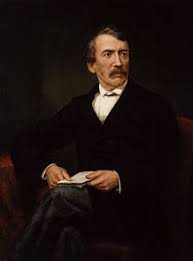Hi my dear friends, we are going to know a bit more about this unique man, Doctor Livingstone, a British explorer and anti-slavery missionary.
Hola mis queridos amigos, vamos a saber un poco más sobre este hombre único, el Doctor Livingstone, un explorador y misionero anti esclavitud británico.
Info: from Speak Up magazine.
Photos: es.wikipedia.org / alamy.es / en.wikipedia.org
LOST AND FOUND IN AFRICA.
DR. LIVINGSTONE, I PRESUME...
Two exhausted men, one American, one British, met for the first time in a town in the centre of Africa in November 1871. When the American opened his mouth to speak, his four-word phrase would soon become the most famous question in the English language: "Doctor Livingstone, I presume?" And with these words also ended the most celebrated search and rescue mission in modern history.
FAMOUS EXPLORER
David Livingstone, Britain's world famous explorer and anti-slavery missionary, had been missing in Africa for four years. The British Government had shown little interest. His rescuer was a young American journalist, Henry Morton Stanley, sent to Africa by James Gordon Bennett, the editor of the New York Herald, who hated the British and saw an opportunity to humiliate them by finding their hero. Livingstone had spent six years looking for the source of the River Nile. Explorers had been searching for the source for almost 2,500 years.
EXPEDITIONS
Explorers in the 19th century enjoyed the fame of modern-day rock stars. Livingstone, with his crooked left arm and walrus moustache, was instantly recognizable. He had walked across the Kalahari Desert, traced the path of the 2,200 mile-long Zambezi River, and walked from one side of Africa to the other. The explorer, however, was in trouble financially. When the Royal Geographic Society asked him in late 1864 to find the source of the Nile, a mission that could make him rich, he did not think twice.
TERRIBLE CONDITION
In May 1871, six years into his expedition, Livingstone found himself in Nyangwe, near Lake Tanganyka, desperately weak from anaemia, dysentery and bone-eating bacteria. The rest of his expedition party had either died or disappeared, and moved on to the town of Ujiji, on the shore of the lake Stanley, meanwhile, had reached Tabora, just 350 kilometres away, and was similarly weak through malaria, dysentery and smallpox. The rumour of the presence of a white man in Ujiji, however, was just the news he needed.
FAMOUS MEETING
Stanley's caravan entered Ujiji on November 10th. Stanley saw a pale, skeletal white man in patched clothing. Shocked, but knowing he was making history, he said: "Doctor Livingstone, I presume?" "Yes". Stanley continued: "I thank God, Doctor, I have been permitted to see you." "I am thankful", Livingstone replied, "I am here to welcome you."
HERALD EXCLUSIVE
Over the next five months, the two men formed a profound bond. Then Stanley left for home. On May 2, 1872, The Herald announced its exclusive under the headline "Livingstone Safe".
The story was an international sensation and Stanley arrived in the United States a hero. Livingstone, however, would never see England again. His body destroyed by disease, he died in Zambia on May 1, 1873. His remains were buried in Westminster Abbey. The Nile had claimed another victim.
*******************************************************
VOCABULARY
-TO PRESUME: suponer / TO MEET: encontrarse con. / SEARCH AND RESCUE: búsqueda y rescate / SLAVERY: esclavitud / TO BE MISSING: estar desaparecido / EDITOR: director / TO HATE: odiar / CROOKED: desfigurado / WALRUS MOUSTACHE: bigote de morsa / TO TRACE THE PATH: seguir el curso / SIX YEARS INTO: transcurridos seis años / QUEST: misión / SHORE: orilla, costa / SMALLPOX: viruela / PATCHED: remendada / BOND: vínculo / HEADLINE: titular / TO BURY: enterrar / ABBEY: abadía / TO CLAIM A VICTIM: cobrarse una víctma.





No hay comentarios:
Publicar un comentario